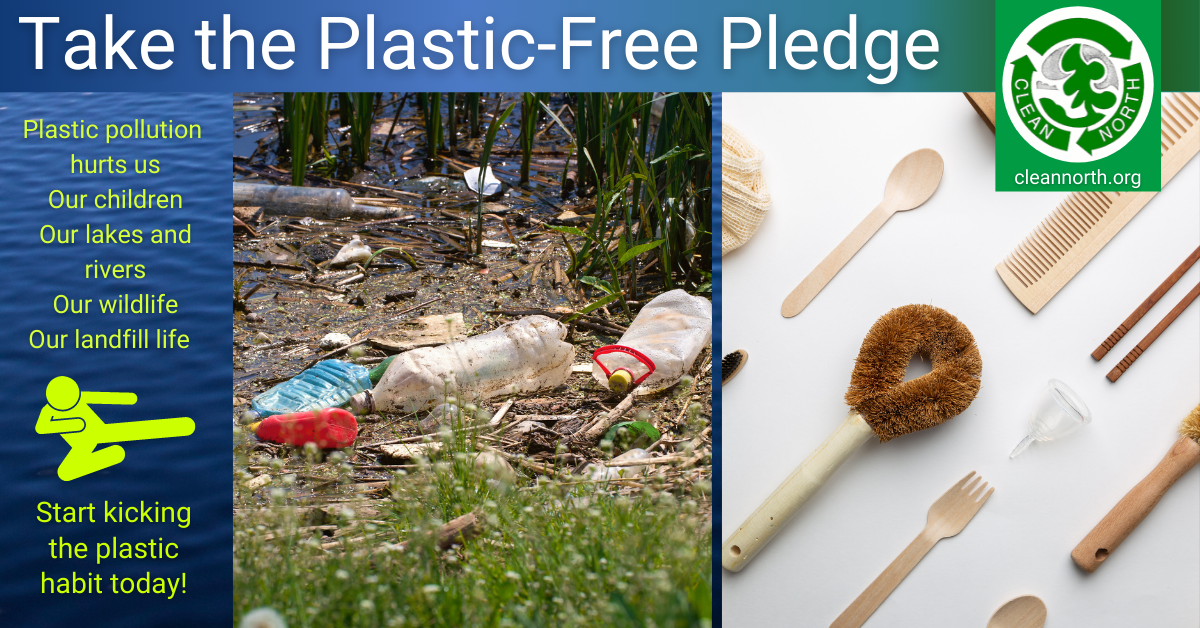
The City of Sault Ste. Marie and Clean North have created a Plastic-Free Pledge Program to help local people, businesses, and institutions to take meaningful action to reduce their use of single-use plastics.
So why tackle plastic use?
- To extend landfill life: Plastic materials pose a huge waste management problem for cities like ours. Space is at a premium in our local landfill! If we buy less plastic stuff and replace with reusable or compostable materials when possible, then we can reduce the pressure on landfills.
- Reduce pollution: It can take hundreds of years for plastic to break down, plastic items can leach toxic chemicals into our soil and water, and plastic can splinter into tiny bits known as microplastics. The bits can end up in our lakes and rivers, the fish we eat, and even human placentas, with potential harm to all. So the less plastic we use, the better for us, our families and the environment.
But what about recycling?
Only a few types of plastics are recyclable here in the Sault: bottles and jars marked #1 and #2 on the bottom. They must be clean and lids must be removed. No other plastics are recyclable! (Read our top tips for curbside recycling here.)
And recycling is a failing strategy. The bottom has dropped out of recycling markets since Asia closed its doors to our waste, and often loads of recycled plastic end up in the landfill because they are too contaminated with non-recyclables like plastic bags and margarine/yogurt tubs.
Reducing plastic use is critical to solving our plastic problem!
What does taking the pledge mean?
To take the Sault Ste. Marie Plastic-Free Pledge means a person or business/organization/ institution resolves to stop buying/acquiring 3, 6, or 10 single- and/or short-term-use plastic items — these items should represent a major portion of their plastic waste. In other words, we encourage those taking the pledge to choose challenging targets. Steps are below:
- Conduct a single-use plastic audit of your home or business/organization/ institution (find link to audit checklist here) to determine which single-use or short-term-use plastics make up a major part of your waste stream. Performing a waste audit over time (1-4 weeks) is an optimal way to collect waste data but may not be feasible for everyone.
- Choose your pledge level (Gold–10 plastics, Silver–6 plastics, or Bronze–3 plastics) and complete this form. If you are unable to complete an online form, please email us at info@cleannorth.org and ask for an alternative.
- Estimate quantity of each category of single-use plastics used/procured in the previous year (if possible; a shorter period is acceptable). For example: If you estimate that you take in and throw away 4 sets of plastic cutlery due to takeout meals per month, that would be 48 sets per year.
- Over the next six months, track whether any single-use plastics you pledged to give up are used in your business/organization/household and if so, how much.
- After six months, contact Clean North and report back on the amount of plastic reduction. You will receive an award certificate from Clean North and the City, and your achievement will be listed on the Clean North Plastic-Free Sault Hall of Fame page. Clean North will also profile various people and businesses/organizations/institutions that take the pledge and reduce plastic use via the Clean North blog, social media, webinars, etc.).
Businesses/organizations/institutions are encouraged to ask their staff to consider making individual pledges as well.
So how about bioplastics?
Replacing regular plastics with bioplastics marketed as green, degradable, biodegradable, or compostable is tricky.
Here’s why: Some don’t actually decompose into inert ingredients but rather fragment into microplastics in the environment. Others may actually be able to break down but don’t under landfill or composter conditions. Plus many people see a green symbol on bioplastic products and assume that means they are recyclable, which they most definitely are not. Recycling facilities do not appreciate having to deal with bioplastics contaminating recyclable loads.
So we recommend avoiding bioplastics unless you’ve done your homework and are 100% convinced the product is as green as claimed.
Want to know more?
- 100 steps to a plastic-free life
- Follow Clean North on social media (@cleannorthsault), as we regularly post tips for reducing plastic use and other waste.
- Questions? Email us at info@cleannorth.org.
